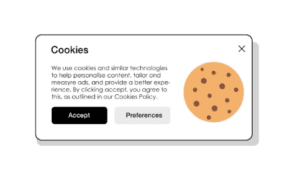Cookies are small information that websites save on your device to remember things like your preferences and your web browsing history. They can help store your shopping cart, recommend products, and tailor your online experience.
However, cookies are getting a bad rap lately, thanks to new privacy legislation. And Google’s Chrome browser is phasing out third-party cookies by 2022.
What Are They?
The three categories of computer cookies are session, persistent, and third-party cookies. These nearly invisible text files are all very different from one another. These cookies are designed to track, gather, and store any data that businesses require, and each has its specific purpose. Third-Party Cookies are a type of cookie created by websites other than the one you’re visiting. These cookies are often used for tracking or advertising purposes. This is why you must understand the types of third-party cookies.
When you’re browsing a website, it sends requests to servers on the internet to create these third-party cookies. These servers then store them on your device to track your website activity.
These cookies can be helpful for users, as they allow companies to target ads based on your preferences and needs. However, they can also be a privacy concern for many people.
For instance, imagine you’re on a website and see a shady email from a marketing company with your name, phone number, and street address. That may seem random, but it’s from a company that uses third-party cookies to sell your data to other parties.
You can check whether a site uses third-party cookies by opening the developer console (inspect element) on your browser, such as Firefox or Safari. This will reveal the domains that the website uses.
Currently, most browsers offer a way to block these cookies. The major ones include Google Chrome and Mozilla Firefox. However, some older browsers may not support this feature. In that case, you can use a free online tool that will scan your website and provide you with a list of all cookies.
How Do They Work?
Cookies are small files that websites store on your computer. They enable a site to remember your actions and preferences across different areas. They also help websites analyze how visitors use their sites and improve them.
A typical example is how many advertisers and social media platforms track users’ browsing behavior. They can then use this data to target you with more relevant ads based on your interests.
Most web browsers let users select which cookies they want to save on their computers to prevent this from happening. Some even offer ad-blockers that eliminate third-party cookies.
However, some third-party cookies are unsafe to use since they can be hacked and used to spy on your online activities. This happens when cookies are not sent over secure channels, such as SSL/TLS.
As third-party cookies become more and more prevalent, it’s essential to understand how they work. In short, these cookies are tracking codes placed on a user’s computer after visiting another website.
As a marketer, staying up-to-date on the latest news related to data privacy moves and their potential impacts on your business is crucial. If you rely on third-party data for your advertising strategies, it’s critical to consider alternatives now.
What Are They Used For?
Third-party cookies are created by a domain other than you’re visiting. They’re typically used for tracking, ad serving and retargeting.
They’re used by various companies, from websites that sell products to advertising agencies and analytics services. These cookies can track users across multiple websites and even on social media.
First-party cookies are stored on the website you’re browsing and are used to provide services, such as remembering items in a shopping cart or giving personal recommendations for the website’s content. They also store user preferences and settings, such as language or usernames.
A website can control which cookies it uses and how they’re used by selecting “Cookies” on the left side of the screen. However, this can make it more difficult for people to use the site.
Another way to limit the number of cookies your web browser sends is to delete them before you visit a new website. This can help to keep your computer clean and prevent malware and adware from being installed on your device.
As technology evolves and privacy laws pressure companies, third-party cookies may soon disappear. Some major web browsers have announced plans to block them by default. These include Apple’s Safari and Mozilla’s Firefox.
How Do I Block Third-Party Cookies?
Cookies are files that websites save on your computer to remember your browsing preferences, give you locally relevant content and make it easier for you to sign in. They also help web pages work efficiently.
Most browsers let you control cookies. Most have options to delete existing cookies, allow or block all cookies, and set preferences for particular sites.
While cookies can be helpful to your online experience, they can also raise privacy concerns. They can track you across multiple domains and websites, making it easier for advertisers to target you with personalized ads.
So, if you’re concerned about your online privacy, you should block Third-Party Cookies. But be warned: blocking them can disable some features and functions of websites or even cause those websites to stop working altogether.
In addition, some of these third-party cookies don’t have a direct connection to privacy concerns; for example, they may be used for advertising or analytics. So, it depends on your personal preference as to whether you want to block them or not.
To block third-party cookies in Chrome, click or tap the “Safari” menu button from its top right corner and select “Privacy & security.” In the next panel, scroll to the “Cookies and other site data” section and uncheck all items. Then, click or tap “OK.”



































